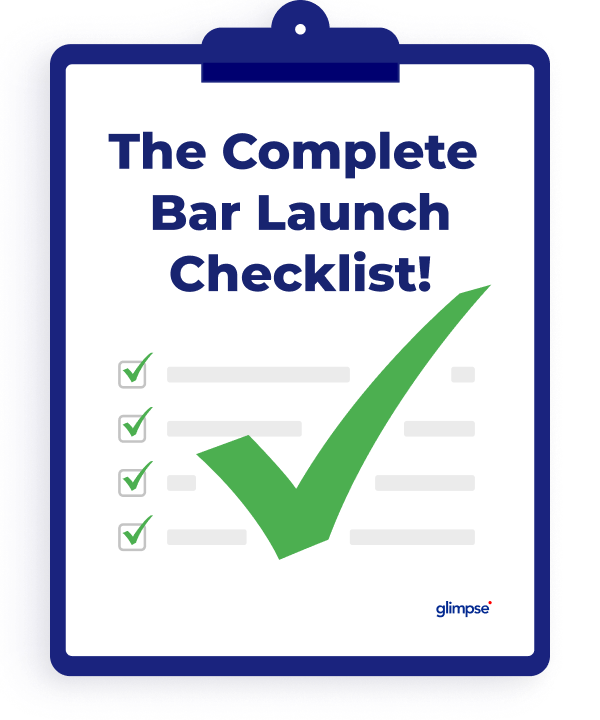You’ve decided to start your own bar in New York. While congratulations are in order, you’re not quite there yet. You’ll need to do the groundwork and know what it takes to run a successful business before you can open your doors. You must have a solid vision in place covering everything from your business plan and financing to license requirements and marketing.
Ready to become a successful bar owner? This guide will walk you through everything you need:
1. A Solid Vision and Business Plan
Many businesses fail because they don’t have a solid vision backed up by a sound business plan. Your plan should include the following:
- A strong mission statement
- Your bar concept and design
- Your beverage and food menu plus pricing strategy
- Market analysis and research
- Startup costs and financing
- Choice of business entity – partnership, sole-proprietor, or LLC
We created a step-by-step guide to write your business plan here.
2. Concept, Design, and Location
Part of your strategy for opening a bar in New York is having a strong concept and design plan that will attract your target market. You need to have a clear picture of what type of bar you want to operate and who will be your clientele.
Design
Once you’ve decided on your concept – brewpub, neighborhood bar, tavern, sports bar, or nightclub – you’ll be ready to move on to bar design. What type of ambiance and character do you want your customers to experience when they walk into your bar?
When you know the answer to this, you’ll be ready to choose your bar name and plan your décor. Factor in the following to match your design to your brand:
- Floor plan and seating
- Furniture and tabletops
- Lighting
- Color and wall art
- Glassware
If you need some inspiration, check out these bar design ideas.
Location
Location plays a massive role in the success of your new bar. You want to choose an area that your target market frequents. Look for places where people are already mingling, such as downtown areas with plenty of foot traffic. Another location to consider is a neighborhood that is lacking in entertainment venues. Your marketing strategy could target those customers who live close to your bar.
Don’t forget to consider accessibility for your patrons and parking. If your bar isn’t easy to get to, customers will find one that is.
3. Startup and Operating Costs
You’ll need to outline your startup and operating costs to know exactly how much financing you need to open your doors and keep your business afloat for the first year.
Startup costs
Your startup costs will vary depending on if you’re opening a new bar or taking over the premises of an already established bar. Typical startup expenses include:
- Operating reserve for one year
- Renovation costs
- Bar and kitchen equipment
- POS system for payment and inventory
- Insurance
- Licenses, permits, and other legal costs
- Mortgage and rent payments
- Emergency and miscellaneous funding
Operating costs
Your operating costs are what it will take to run and maintain your bar for the first year that you’re open. Typical operating expenses include:
- Alcohol and food inventory
- Employee salaries
- Utilities
- Advertising and marketing
- Accounting expenses and office supplies
- Maintenance and repairs
You can get a full cost breakdown of starting a new bar in this article.
4. Financing Your Bar
When opening a new business, you need to have a clear, realistic budget in place and figure out how much financing you need. Add up all the startup and operating costs and create an estimate of how much it will cost you to keep your bar open for one year. It’s best to over-capitalize and not underestimate your startup financing. To ensure enough funding for that crucial first year, add 10-20% to your forecast.
Once you know how much financing you need, do you have enough of your own capital to start your bar and get it running? Do you need to reach out to banks or investors? Knowing exactly how much financing you need will ease the process of finding investors or applying for a business loan.
5. New York Liquor Licensing and Permits
As a new bar owner, you should figure out what types of licensing and permits you’ll need before opening your doors. To protect yourself and your employees, make sure you’re aware of all the regulations and rules that go along with starting a bar in New York.
Liquor license
You’ll need a liquor license to sell any type of alcoholic beverage in the state of New York. The first license to obtain is at the federal level from the Alcohol and Tobacco Tax and Trade Bureau (TTB).
Along with the license from the TTB, you’ll require an On Premises (OP 252) license at the local level in the state of New York from the Alcohol Beverage Control (ABC) agency to sell alcoholic beverages to your customers.
Wait times to obtain liquor licenses from both the TTB and ABC agency in New York state can often take a couple of months or longer to process. You’ll want to submit your applications as soon as possible, so you don’t risk delaying the opening of your bar.
When going through the process of getting your New York liquor license, consider hiring an experienced lawyer to help you navigate all the paperwork and fully understand all the requirements needed for approval. For information on requirements necessary to file, visit the ABC site specific to an On-Premises license.
Food license
If you’re going to be serving food, you’ll need a Food Service Establishment Permit. This will allow you to prepare and provide food for your clientele.
Renovation permit
If you plan on renovating before you open, you’ll need a Department of Buildings permit. Talk to a contractor about what you need to do to apply for this permit.
6. Hire Your Team
Hiring the right employees you can trust is key to providing great customer service for your clientele. Make sure your new staff is aligned with your vision for the bar and that they have excellent people skills. Get your team together well in advance of your opening day, so you have plenty of time to train.
Your team should include:
- A reliable and responsible bar manager
- Experienced and personable bartenders
- Efficient and friendly servers
- Experienced kitchen staff
Recommended reading: 19 Ways to Motivate Your Bar Employees
7. Accounting, Inventory, and Payment Process
To keep things running smoothly, you’ll need to implement a process for accounting, inventory, and taking payment.
Accounting
You can do it yourself with accounting software designed for bars or hire an accountant. No matter what method you choose, an accurate accounting system lets you know exactly where you stand with your finances each month. You’ll be able to make adjustments where needed so that you can improve your cash flow and overall business decisions.
Inventory
Gone are the days of doing your inventory manually. Instead, you can rely on inventory software designed for the bar industry. This software can help you control and manage your alcohol inventory. You’ll know when you’re running low on stock and it’s time to order so you don’t end up taking popular items off the menu on a busy night.
POS payment system
Investing in a POS system will help you and your team stay on top of orders and payments from your customers. Take your time looking for the right POS for your bar, choosing one that best simplifies your business operations with these features:
- Creating open tabs with the ability to add items to the ticket
- The ability to split the check between customers
- Credit and debit card preauthorization
- Tip percentage suggestions
- Detailed reports
- Inventory management
Here’s a breakdown of the top 5 POS systems for bars right now.
8. Advertising and Marketing
Don’t forget to factor in your advertising and marketing plan when starting your New York bar. Be sure to advertise the opening and then transition into ongoing marketing, so you keep that clientele coming in even after your grand opening. Hosting an opening party is an excellent way to bring attention to a new bar.
One of the most important ways to market your business is by having an online presence so your customers can easily find it. Create an inviting website that showcases your bar, staff, and the drinks you serve, such as your signature cocktail.
You’ll also want to build your profile on social media platforms such as Facebook, Instagram, and Twitter. This is a good way to reach new customers and outshine your competition with your savvy advertising and promotions.
Lastly, encourage your customers to write reviews on platforms such as Yelp. Just make sure that you respond to this customer feedback within 24 hours to show that you’re paying attention and are available to meet their needs.
9. The Essentials
When you have all the legal and operating requirements in place, you can start taking care of the other essentials, such as finding suppliers, buying bar equipment, and planning your menu.
Use this checklist to help you finalize your opening:
Liquor suppliers
Make a list of the beers, drinks, and wines you want to serve in your bar, and then find the best suppliers for these products. Here are some qualities to keep in mind when choosing a supplier:
- Has the selection of the brands you want to serve
- Offers discounts and payment terms
- Provides a minimum order purchase
- Is reliable with delivery dates
- Can provide references from other bars and nightclubs.
Bar equipment
You’ll need a few basics to serve drinks:
- Liquor dispensers
- Blenders
- Ice machine and bins
- Glassware
- Glasswasher
- Bartending tools
- Floor and bar mats
Check out this article for a full list of bar tools and equipment.
Food and kitchen equipment
If you’re going to have a food menu, you’ll need a well-equipped kitchen with all the essentials for cooking:
- Food inventory for all menu items
- Ovens and grills
- Fryers
- Cooking utensils
- Plates and cutlery
Final Thoughts
Your startup plan for opening your bar can make or break your business. New York is a competitive city, but we’ve equipped you with all the basics and essential information you need to make your new bar a success. Follow these guidelines and put in the work to make your dream a reality, and you’ll soon be rewarded with customers and a business that runs smoothly.










 +1 (786) 292-2373
+1 (786) 292-2373 insights@glimpsecorp.com
insights@glimpsecorp.com





